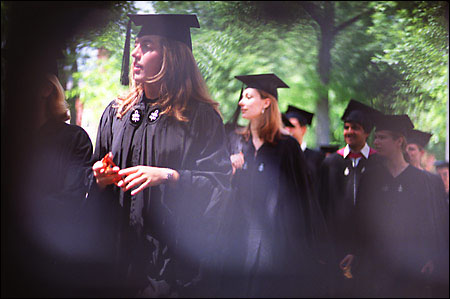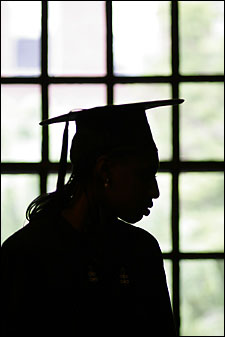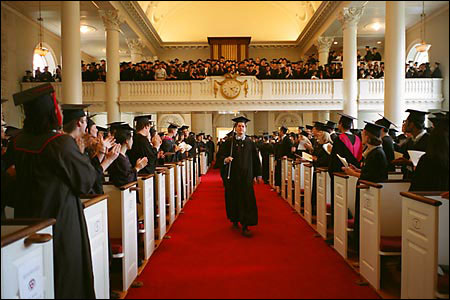Freshmen together
It’s been a learning experience for me as well, Summers tells Class of ’05 in Baccalaureate

In his Baccalaureate address, Lawrence H. Summers spoke to the graduating seniors less as Harvard’s president and more as an honorary member of the Class of 2005, which, in a manner of speaking, he is.
Although he is not graduating with the class, Summers did arrive at Harvard around the same time they moved into their freshman dorms, and that sense of starting out together has given him a feeling of kinship with this group of undergraduates.

“One thousand three hundred sixty-seven days ago under the trees outside this building, we began our Harvard educations,” he said.
Summers spoke of the terrible disruption that occurred while both he and they were just settling into their respective roles at Harvard – the terrorist attacks of Sept. 11, 2001. He described his feelings of uncertainty as he delivered morning prayers at the Memorial Church on Sept. 21, and his belief that the most positive response he could make to these frightening events was to affirm the values that Harvard has always represented.
“I thought that by teaching and learning we could do our part to uphold civility and reason. Whatever was on the syllabus, there was also what the syllabus stood for: human exchange, shared work, and constructive purpose.”
Eventually, the events of 9/11 receded and the rhythms of academic life began to reassert themselves. But for the freshmen, as well as for Summers, there were still challenges to be met.
“Fairly quickly, I’d guess, many things happened here that threw you a little off stride. You wrote a paper that would have won you kudos in your high school, but here earned you a B-. You found your long-cherished dreams of pursuing a particular career impeded by the fact that you actually found the subject boring, or, worse, by your mediocre mastery of it.”
Summers compared the setbacks the students experienced with the struggles he encountered as he tried to make a transition from the world of Washington politics to the world of Harvard.
“The fact was that the skills I had honed and the moves I had learned in my days as an economist and in government struck some people as … well, let’s just say they found them less than suave.”
Finding themselves out of their element, faced with problems they did not feel equipped to deal with, both Harvard’s president and its entering class may have had similar feelings.
“What had happened to all those reporters wanting to hear my latest thoughts on the yen? Where, you may have found yourself wondering, was the indelible glory of your Herculean high school feats of wonder?”

As the years passed, however, the students found their way out of these initial difficulties, gained confidence, and discovered activities that enriched their academic experiences. But that growth experience, however gratifying, would be only one in a series in which they would be required to adapt to new circumstances, Summers told them.
“Within a few months, no matter what your resume says, you’ll be at square one and relying, essentially, on your capacities in a new environment. What will matter then will be your ability to adapt to the customs, ways, and rhythms of a new situation and show how you can contribute.”
This ability to draw on one’s own innate capacity and to adapt to new situations corresponds to what Ralph Waldo Emerson described as “thinking,” as opposed to the mere accumulation of knowledge, Summers said.
“Which is to say that your diploma, of which you should be proud, will not do your thinking for you. Nor will most of the specific historical facts, mathematical theorems, philosophical doctrines, economic data, or works of matchless art you learned at Harvard. Fresh occasions will require fresh combinations, which you, yourself, will have to fashion as you go. Nothing worth thinking about has a ready answer.”
But where a Harvard education may be of help, Summers said, is in training the mind to look beneath the surface of things, to analyze problems, and to argue logically and cogently. Armed with these tools, students may be able to make valuable contributions to a world much in need of solutions.
“If you have come to understand how rare are so many of the values that we take for granted – freedom of expression, of exchange, freedom from profound material need – you will see how much scope for action you have in the world, and how much there is for you to do.”
Summers hailed the power of original thinking, in Emerson’s sense, to transcend library walls and university gates and to penetrate into the world beyond.
“One of the majestic gates to this Yard bears a simple inscription: ‘Enter to grow in wisdom.’ Four years ago, you came through those gates. I came with you. I hope you are the wiser for it. I know that I am.”




